Last Updated on November 14, 2025
Like a moody, temperamental artist, our boilers and central heating systems can – at times – be unpredictable and fussy. When they’re in a good mood, they heat our homes beautifully. But when they’re not, it may decide to give you the cold shoulder. Or should we say, cold shower?
Occasionally, you’ll need to coax it with a little TLC, maintenance, and care – and central heating system inhibitors are one way to do it!
Inhibitors play a vital role in keeping your home warm – protecting the system from corrosion and shielding it against other potential problems.
The issue with central heating systems is that they clog up with rust (corrosion), sludge, and other debris over time. These cause havoc to the system, from slower functionality to shorter life expectancies – ultimately affecting their heating abilities.
Adding a central heating inhibitor is a great way to prevent these issues from happening in the first place.
But which inhibitor is the best to use?
Contents
Our Top 5 Picks For 2025
These are 5 of the best corrosion inhibitors for heating systems currently on the UK market!
1. MagnaClean MC1
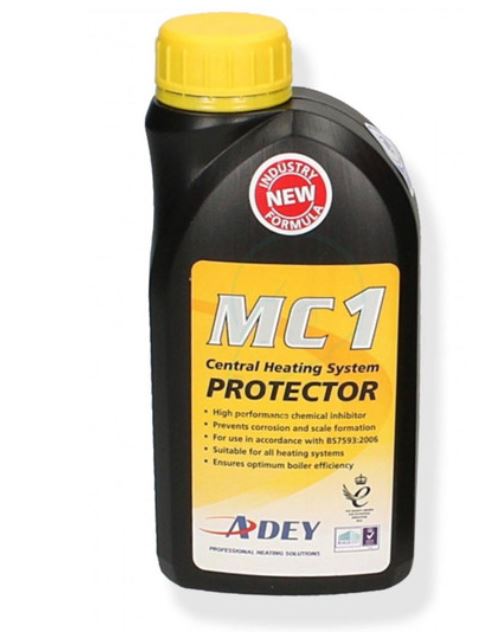
MagnaClean MC1’s new, stronger formulais one of the best central heating inhibitors out there, preventing both rust and limescale build-up in a single application. Get more bang for your buck with this nifty cleaner, as it treats up to 25% more than traditional inhibitor solutions!
Whether you have a sealed or open vent system, MagnaClean will do the trick! It’s a reliable choice for homeowners looking to protect their central heating system from common issues like corrosion and scale. This cost-effective, high-concentrate formula is also compatible with most boiler heating systems.
MagnaClean MC1 protects components from damage, extending the lifespan of your central heating system. And, it helps reduce energy and maintenance bills by keeping systems well-maintained and sludge-free too!
| Pros |
| Cons |
2. Sentinel X100
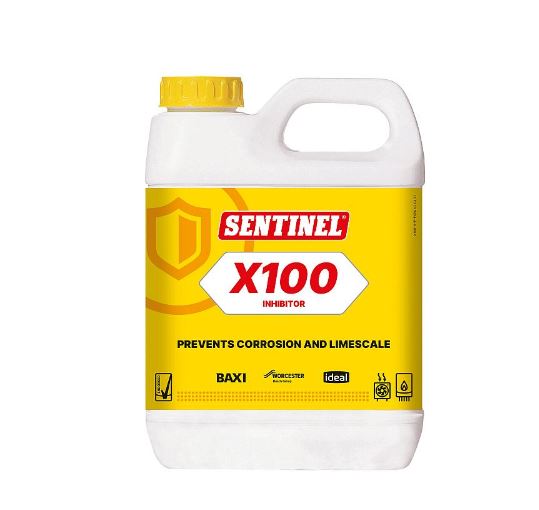
Another top-class central heating inhibitor is Sentinel X100. Formulated with TripleTech™ Anti-Corrosion Technology, this unique blend offers unrivalled protection for multi-metal hydronic systems – including those with aluminium parts.
You can add Sentinel X100 via the feed and expansion tank, by-pass feeders, dosing adaptor, or directly into the system. This product reduces limescale and rust and is an excellent investment for the longevity of your central heating system.
| Pros |
| Cons |
Top tip: A concentrated 300 ml bottle (a.k.a. The Rapid-Dose™) allows for quick dosing without the need to drain or depressurise your system.
3. Fernox F1
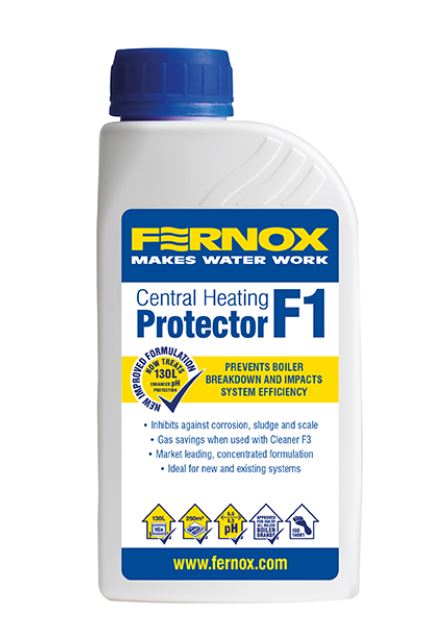
Fernox F1 is a market-leading inhibitor used to prevent scale formation and corrosion. It offers superior protection for your heating system and is highly recommended by homeowners and professionals.
Not to mention, this product extends central heating system lifespans, improving system efficiency and reducing the likelihood of breakdowns or costly repairs!
Its triple-action formula gives you the best of three worlds:
- Organic particles – that bind to metal within your heating system
- Protection from debris
- Anodic inhibitors – that create a protective layer on system components.
| Pros |
| Cons |
Top tip: To apply this formula directly into your central heating system use the inhibitor dosing adaptor.
4. Sika Everbuild P14
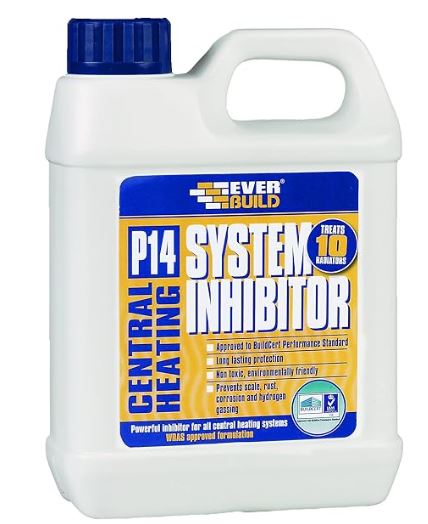
Sika Everbuild P14 is a versatile, cost-effective and environmentally friendly central heating inhibitor that does not contain any mineral oils. It effectively removes limescale, sludge and signs of early corrosion from your central heating system.
Sika P14 is compatible with a wide range of system materials, ranging from aluminium and copper to steel and brass. It’s also suitable to use for microbore systems made from plastic pipes.
| Pros |
| Cons |
5. CosWarm CW1
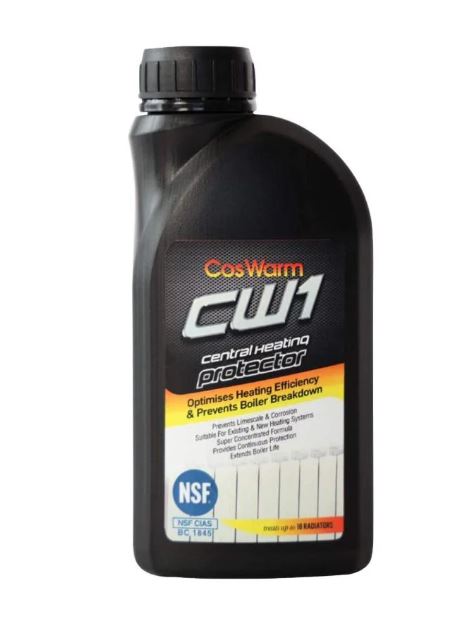
If you want to prevent costly repairs and pesky maintenance issues – use CosWarm’s CW1 central heating inhibitor. It’s designed to extend the lifespan of your central heating system and is suitable for all types of boilers, radiators and pipework systems.
This super-concentrated, pH-neutral formula protects your central heating system and prevents frequent radiator bleeding, ensuring your home is kept nice and toasty without delay.
It’s another product that is compatible with many system materials, such as copper, aluminium and stainless steel. CosWarm’s CW1 is NSF-approved and is one of the most cost-effective central heating inhibitor solutions on the market!
| Pros |
| Cons |
Alternative solutions
While central heating inhibitors, like MagnaClean MC1 and CosWarm’s CW1, are important in maintaining the health of your heating system, there are a couple of alternative solutions that you can use in conjunction with them:
Magnetic filters
Magnetic filters are designed to catch magnetic debris (e.g. rust particles). If left unchecked – or downright ignored! – they can seriously cause damage to your central heating system. Think blockages and reduced system efficiency!
Benefits:
Cost considerations:
- Magnetic filters range between £65 and £150 (depending on what central heating system you have)
- Qualified technicians will charge roughly £100 – £150 per hour for installation
Scale reducers
A scale reducer reduces scale build-up, hence the name. A scale-free central heating system uses less energy to heat your home, saving you money on your energy bills.
Benefits:
Cost considerations:
- Scale reducers range from around £10 to £160 – ensure you choose one that is compatible with your central heating system!
- They’re quite easy to install, with many homeowners opting to install them themselves
Why You Need A Central Heating Inhibitor
This is an easy one to answer: If you care about effective central heating maintenance – use a central heating inhibitor! Not only do they reduce sludge build-up and keep our heating systems running optimally, but they also help prevent future problems and costly repairs!
But how do inhibitors do this?
Apart from inhibitors, there are additional ways to clean your system and improve its lifespan. Make sure to read our guide on how to clean a central heating system to keep your system in tip-top shape.
Choosing The Right Central Heating Inhibitor
There are different types of inhibitors on the market. The amount and type of inhibitor you use depends on the size and type of your home’s heating system. Other factors like how many radiators you have also play a role in dosage – so let’s clear this up, next:
Top tip: It’s always best to follow the manufacturer’s guide when using central heating inhibitors.
Compatibility
Opt for central heating inhibitors that are compatible with your home’s central heating system. Whether you have an open, sealed, or combi system, using the wrong product can lead to inefficiencies or potential issues with your system’s functionality.
Manufacturer recommendations
If you’re someone who doesn’t like to be told what to do, ignore inhibitor guidelines – but be prepared for potential problems! Not only do these manufacturer recommendations ensure inhibitors are compatible with your central heating system, but they are often associated with heating system setup warranties.
(This means some warranties will be invalid without the use of specific products.)
Warranty considerations
Think about how your choice of heating inhibitor might impact the warranty of your heating system. Does the warranty say that a particular brand name inhibitor must be used? Or has it advised against using certain products?
Make sure whatever your warranty says, you do it!
Requirements
If you are unsure about which product to use, contact heating professionals or experts, like Eco Happy, to evaluate your central heating system.
Longevity of protection
How long do inhibitors last?
This is a tricky one to answer as different brands or formulas have different “active” durations. For example, some heating inhibitors offer longer-lasting effects compared to others; ranging from a couple of months to a year.
Factors like the age of your heating system, the amount of debris and system efficiency should also be taken into account.
Top tip: Usually, longevity durations are mentioned in the manufacturer guidelines – see, it’s worth reading them after all!
When And How To Add Inhibitors
Adding a heating inhibitor at the right time during system maintenance is important for optimal effectiveness, such as during initial installation or routine system checks.
The condition of your central heating system also plays a role in this department. For example, a cleaner system (i.e. with less debris) will spread the solution much easier than a clogged-up one.
Telltale signs of central heating system problems could show up as:
- Inefficient heating, like cold spots on radiators
- Little to no hot water
- Boiler pressure problems
- Weird noises coming from central heating or boiler units
- Unusually high energy bills – without any logical explanation
While these symptoms tell us that our central heating system isn’t operating how it should be, adding a heating inhibitor may not always be the solution. Consider factors like component malfunctions (e.g. heat exchangers, expansion tank, radiator bleed plug, temperature sensors, etc.) before resorting to heating inhibitors. Chat with the experts if you are unsure.
How to use a central heating inhibitor
- Always refer to the manufacturer’s guide. Some products, like Sika’s Everbuild P14, require you to bleed radiator valves – by releasing the bleed plug – before adding the solution to your central heating system.
- Always ensure your safety – something that essentially eats away at rust, isn’t very good for our eyes or nostrils!
Determining the required amount
- Accurate dosage is vital as adding too little solution may prove inefficient.
- Again, refer to the manufacturer’s guide for the correct amount needed. Some inhibitors may need 1 litre of solution but only come in 500 ml bottles.
FAQs
What is a central heating inhibitor?
Central heating inhibitors are heating system protection products – a chemical solution that is added to our central heating systems. These solutions should be added to your heating system at least once a year as part of an annual boiler service.
Inhibitors contain specialised chemicals that form a protection barrier over metal surfaces within your system. They work their magic by effectively preventing corrosion (rust), scale, and sludge build-up.
Is a central heating inhibitor worth it?
If you’re all about maintaining the efficiency of your central heating system and don’t like throwing money down the drain (no pun intended) when it comes to unnecessary repairs, then a central heating inhibitor is 110% worth it!
How often should I use an inhibitor in my central heating system?
Typically, a central heating inhibitor should be added to your system at least once a year in conjunction with your annual boiler service.
Can you put too much inhibitor into central heating systems?
No, you can’t. If you happen to be a little heavy-handed when adding a central heating inhibitor to your system – do not fret! Adding too much is only a good thing as it offers more protection. However, don’t let this excuse deter you from following manufacturer instructions!
Conclusion
Just like the temperamental artist needs care and attention from time to time, so does your central heating system if you want to avoid cold showers! These heating system protectors keep our systems in tip-top condition, ensuring uninterrupted warmth and longevity, and preventing pricey repairs.
Always follow the manufacturer’s recommendations before grabbing that bottle of central heating inhibitor in the cleaning aisle – as choosing the wrong one for your system can do more damage than good. When in doubt, chat with the Eco Happy team – we’ll happily assist with all your central heating inhibitor needs!
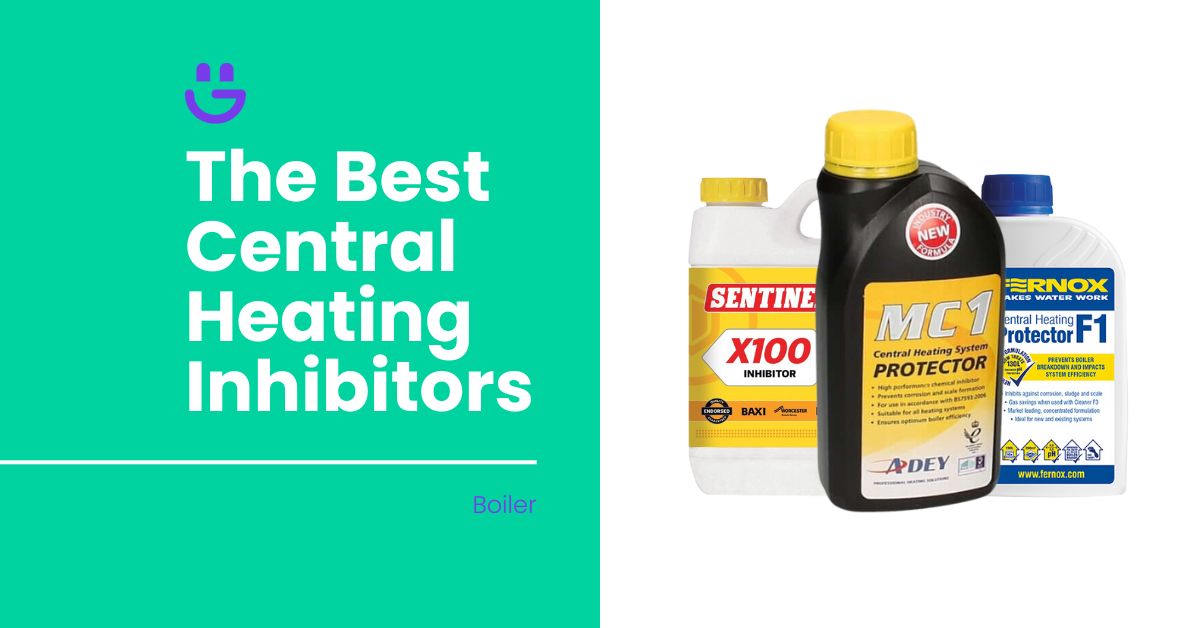





Tom Allen
Solar Expert